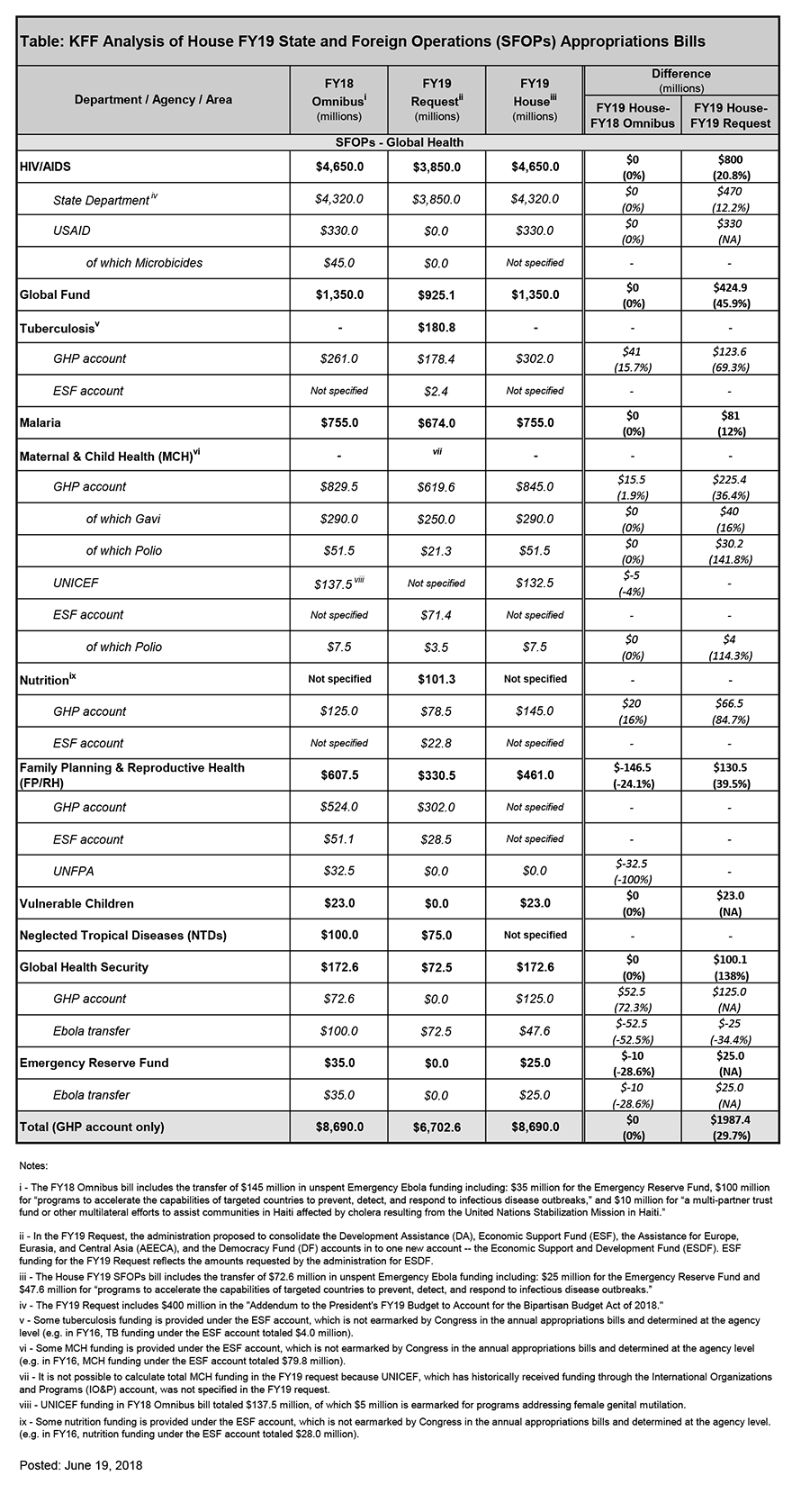House Appropriations Committee approves FY19 State and Foreign Operations (SFOPs) Appropriations Bill
The House Committee on Appropriations approved the FY19 State & Foreign Operations (SFOPs) appropriations bill (and accompanying report) on June 20, 2018. The SFOPs bill includes funding for U.S. global health programs at the State Department and the U.S. Agency for International Development (USAID).
Key highlights are as follows (see table for additional detail):
- Funding provided to the State Department and USAID through the Global Health Programs (GHP) account, which represents the bulk of global health assistance, totals $8.7 billion in FY19, matching the FY18 level and almost $2 billion above the President’s FY19 request.
- Details are as follows (unless otherwise specified, totals represent funding through the Global Health Programs account):
- While funding for most global health programs at State and USAID remains flat compared to the FY18 level, there were increases for tuberculosis (TB), maternal and child health (MCH) and nutrition, and a decrease for family planning and reproductive health (FP/RH); funding for all program areas specified in the bill were above the President’s FY19 Request.
- Bilateral HIV funding through the President’s Emergency Plan for AIDS Relief (PEPFAR) is $4,650 million in the House FY19 bill, matching the FY18 level and $800 million above the President’s FY19 request.
- The bill includes $1,350 million as the U.S. contribution to the Global Fund to Fight AIDS, Tuberculosis and Malaria (Global Fund), matching the FY18 level and $425 million above the President’s FY19 request.
- Funding for tuberculosis (TB) totals $302 million, $41 million above the FY18 level and $124 million above the FY19 request.
- Funding for malaria totals $755 million, matching the FY18 level and $81 million above the FY19 request.
- The bill provides $172.6 million in total funding for Global Health Security (GHS), of which $47.6 million is provided through a transfer of unspent emergency Ebola funding. Total GHS funding in the bill matches the FY18 level (FY18 GHS funding included $100 million through a transfer of unspent emergency Ebola funding) and is $100 million above the FY19 Request.
- The bill provides $25 million to the Emergency Reserve Fund through a transfer of unspent emergency Ebola funding. Funding in the bill for the Emergency Reserve Fund, which Congress established in 2017 with the purpose of enabling the U.S. to respond rapidly to emerging health threats, is $10 million below the FY18 level and $25 million above the FY19 request.
- The bill includes $845 million for maternal and child health (MCH), an increase of $16 million above the FY18 level and $225 million above the FY19 Request. Specific areas under MCH include:
- Gavi, the Vaccine Alliance, which is included under MCH funding, totals $290 million, matching the FY18 level and $40 million above the FY19 request.
- Polio funding, which is included under MCH funding, totals $59 million ($51.5 million through the GHP account and $7.5 million through the Economic Support Fund account), matching the FY18 level and $34 million above the FY19 request.
- The bill includes $132.5 million for the U.S. contribution to the UNICEF provided through the International Organizations and Programs (IO&P) account, $5 million below the FY18 level. While the FY19 request did not specify a funding amount for UNICEF and proposed to eliminate the IO&P account, it is possible that organizations such as UNICEF could receive funding through other accounts.
- Bilateral family planning and reproductive health (FP/RH) funding in the bill totals $461 million from all accounts, which is $114 million below the FY18 level ($575 million) and $131 million above the FY19 Request.
- Funding for nutrition totals $145 million in the bill, $20 million above the FY18 level and $67 million above the FY19 request.
- Funding for vulnerable children totals $23 million, matching the FY18 level. Funding for vulnerable children was eliminated in the FY19 request.
- Funding for neglected tropical diseases (NTDs) was not specified in the bill.
- Codifies the expanded Mexico City Policy (also known as the “Global Gag Rule”) in law, as reinstated by President Trump via executive order on January 22, 2017 (see here for more information on the Mexico City Policy).
- Prohibits funding for the United Nations Population Fund (UNFPA). In FY18, Congress provided $32.5 million for the U.S. contribution to UNFPA, but the administration invoked the Kemp-Kasten amendment to withhold funding for UNFPA (see here for more information on Kemp-Kasten).
Resources:
- FY19 State and Foreign Operations Appropriations Bill – Subcommittee Draft
- FY19 State and Foreign Operations Appropriations Bill – Subcommittee Report
The table (.xls) below compares the FY19 House SFOPs appropriations bill to the FY18 funding amounts as outlined in the “Consolidated Appropriations Act, 2018” (P.L. 115-141; KFF summary here) and the President’s FY19 request (KFF summary here).
Note: Some funding amounts (e.g. global health funding provided through the Economic Support Fund account at USAID) are determined at the agency level, and are not earmarked by Congress in the SFOPs appropriations bill.

The KFF Daily Global Health Policy Report summarized news and information on global health policy from hundreds of sources, from May 2009 through December 2020. All summaries are archived and available via search.
